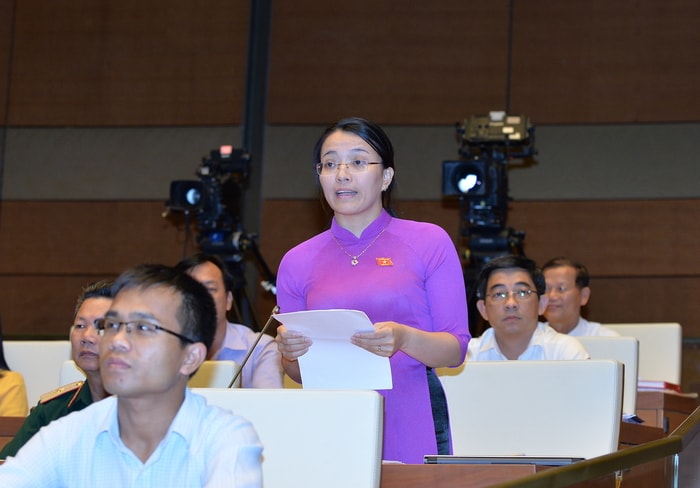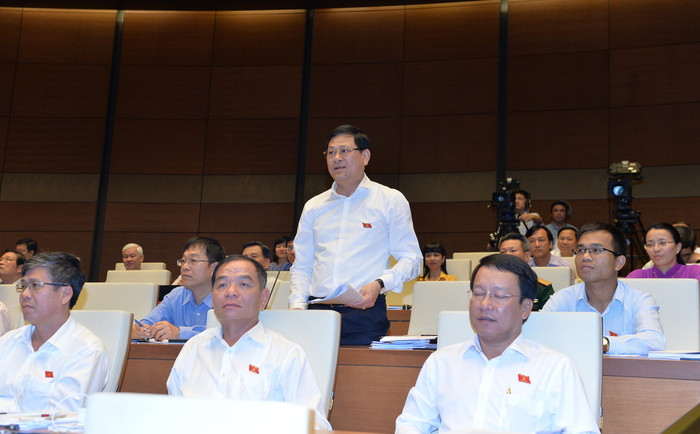Delegate Nguyen Huu Cau: All cases of property seizure are recorded on camera.
(Baonghean.vn) - Speaking at the discussion session in the hall about the draft Resolution on handling bad debts of credit institutions, delegates of the National Assembly Delegation of Nghe An continued to have interesting opinions.
On June 12, implementing the working program of the 3rd session of the 14th National Assembly, continuing to discuss the draft Resolution on handling bad debts of credit institutions, delegate Hoang Thi Thu Trang (Nghe An National Assembly Delegation) said that regarding the mechanism for handling disputes and violations of the law in the process of seizing and handling assets, delegates were not confident about this content.
The explanation of report 134 is only partially correct when there is a dispute between a credit institution and a borrower. However, there will be cases in practice where the dispute is not between a credit institution and a borrower, but the borrower or related persons such as co-owners, heirs, or lessees of the property will request to handle the credit institution during the process of seizing and handling the secured property. Comparing with the current civil law, I see that the mechanism for handling this issue has not been fully or clearly regulated.
 |
| Delegate Hoang Thi Thu Trang gave her opinion at the discussion session in the hall on June 12, 2017. Photo: Huyen Thuong |
Delegate Hoang Thi Thu Trang said that the current Resolution gives credit institutions a very large power to seize and handle collateral assets. This is not a State agency, there are no administrative decisions, administrative actions, so of course there is no right to complain and denounce according to the Law on Denunciation and the Law on Complaints.
Regarding the seizure of assets of the party subject to enforcement, the delegate would like to continue clarifying the inappropriate point in Article 11 of the draft regulation: assets securing bad debts at banks are not subject to seizure to perform other obligations according to the provisions of the law on THA - meaning that they are not subject to seizure to execute decisions and judgments of the Court. Article 90 of the current THADS Law has stipulated to ensure the rights of the mortgagee. If due to the urgency of handling bad debts, it is necessary to continue to stipulate this content in the draft Resolution, it is necessary to consider and weigh carefully:
In case the value of the property is less than or equal to the loan amount, the provision as drafted is reasonable. In case the value of the secured property is greater than the loan amount at the credit institution, the provision not allowing the listing is unreasonable because the loan amount is only a part of the value of the property but the credit institution is allowed to keep the entire property, even though the borrower has other obligations that have been determined by the people's court.
The delegates hope that the National Assembly will consider and study the re-regulation of Article 11 in the direction that: Assets securing bad debts at banks shall not be seized to fulfill other obligations according to the provisions of the Law on Civil Judgment Enforcement; except in cases where the value of the secured assets is greater than the loan at the credit institution or in cases where the seizure is made according to a court decision on compensation for damage to health, life, honor, child support, wages, unemployment benefits, and social insurance.
Participating in the discussion and giving comments, delegate Nguyen Huu Cau (Director of Nghe An Police Department - Nghe An National Assembly Delegation) said that all 18 articles in the Resolution do not have any provisions denying the court's verdict and decision. The court's verdict and decision are the highest and no one can deny it.
 |
| Delegate Nguyen Huu Cau said that the police only ensure security and order when implementing debt collection decisions, and are not debt collection agencies. Photo: Huyen Thuong |
The second problem is that when there is a dispute, for example, related to a third party, related to another account, there are two mechanisms to handle it. First, when there is a dispute, we resolve it according to court procedures. Second, there is a 15-day notice, within those 15 days the debtor has the right to object. If all complicated problems arise at the grassroots level, the grassroots authorities will resolve it. If it is related to the execution of the judgment, the execution of the judgment reflects back, the credit institution will not issue a decision to execute.
Regarding Article 7, it is necessary to clarify that the police are not the agency that collects debts for credit institutions, but only ensure security and order when collecting bad debts. There are 3 levels of ensuring security and order: if normal, the commune level will do it, if more complicated, the district level and possibly the provincial level. It should be open and not rigidly divided as to which level participates, as that would be rigid.
Delegate Nguyen Huu Cau emphasized that in all cases of property seizure, cameras are filmed to ensure objectivity and transparency. If there are any problems later, the cameras will be opened for inspection and review.
PV-CTV Group
| RELATED NEWS |
|---|
